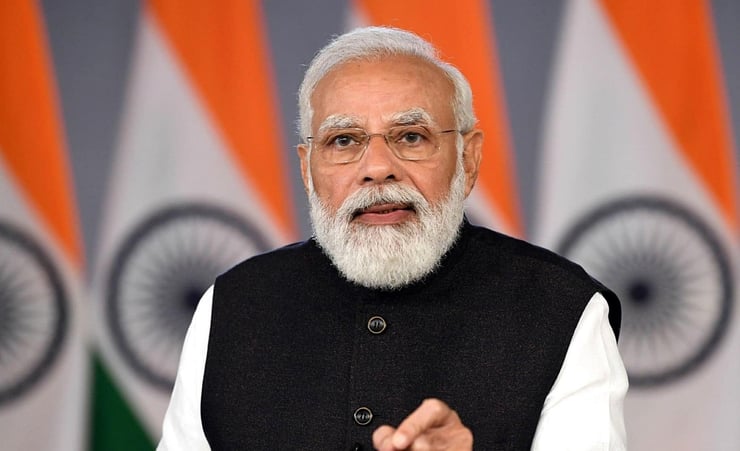India should aim to bring logistics cost to single-digit at earliest: PM Modi

Prime Minister Narendra Modi launched the National Logistics Policy (NLP) on Saturday and said the logistics cost should be brought down from 13-14 per cent to single-digit as soon as possible.
He said that India, which is determined to become a developed country, now has to compete more with developed countries. The Prime Minister called the launch of the National Logistics Policy a significant step in fulfilling the country's resolve of being a developed country. "To ensure quick last-mile delivery, end transport-related challenges, save time and money of the manufacturers, prevent wastage of the agro-products, concerted efforts were made and one of the manifestations of those efforts is today's National Logistics Policy," the Prime Minister said.
The Prime Minister noted that in India, which has become the fifth largest economy in the world, things are changing rapidly. Referring to the release of cheetah on Saturday morning in Kuno National Park in Madhya Pradesh, the Prime Minister said "we all want that logistics should move quickly like a cheetah".
"The echo of Make in India and India becoming self-reliant is everywhere. India is setting big export targets and is also fulfilling them. The notion that India is emerging as a manufacturing hub, is stabilizing in the mind of the world. If we study the PLI scheme we will find that the world has accepted it," the Prime Minister said.
He said the National Logistics Policy will bring new energy to all sectors and noted that policy is a beginning and policy plus performance is equal to progress. "Today's India prepares the ground before bringing any policy, only then a policy can be implemented successfully. National Logistics Policy has not come out of the blue and there are eight years of hard work behind it. There are policy changes, major decisions, and, if I talk about myself, it has my 22 years of governance experience behind it", he said.
The Prime Minister reiterated that schemes like Sagarmala, Bharatmala expedited the work of Dedicated Freight Corridors to improve logistics connectivity for systematic infrastructure development. He pointed out that the total capacity of Indian ports has increased significantly and the average turn-around time of container vessels has come down from 44 hours to 26 hours. For promoting export, 40 air cargo terminals have been constructed. Thirty airports have been provided cold-storage facilities, 35 multimodal hubs are coming up in the country. "Through waterways, we can do eco-friendly and cost-effective transportation, for this many new waterways are also being built in the country," he said, adding that 60 airports have the facility of Krishi Udan.
Stressing the need to adopt technology to strengthen the logistic sector, the Prime Minister said that the government has worked towards initiatives like paperless EXIM trade process through e-sanchit, faceless assessment for customs, provisions for e-way bills, FASTag that have greatly increased the efficiency of the logistics sector.
He also underlined the importance of a unified tax system like GST in smoothening the issues of the logistics sector. Change in drone policy and connecting it with the PLI scheme is promoting the use of drones in the logistics sector.
"Only after doing so much, we have come out with a National Logistics Policy, '' he explained. "From 13-14 per cent logistics cost, we should all aim to bring it to single-digit as soon as possible. This, in a way, is low-hanging fruit, if we have to become globally competitive," the Prime Minister emphasised.
He said that Unified Logistics Interface Platform ULIP will bring all the digital services related to the transportation sector into a single portal, freeing the exporters from a host of very long and cumbersome processes.
Similarly, under the policy a new digital platform Ease of logistics Services -E-Logs has also been started. "Through this portal, industry associations can directly take up any such matters which are causing problems in their operations and performance with the government agencies. A complete system has also been put in place for the speedy resolution of such cases," he said.
PM Modi pointed out that the PM Gatishakti National Master Plan will be supporting the National Logistics Policy in all earnest.
The Prime Minister also expressed happiness while mentioning the support that states and union territories have provided and that almost all the departments have started working together. "A huge data of information related to different infrastructure projects of state governments has been prepared. Today, data from the central and state governments in about 1500 layers are coming on the PM Gatishakti portal," the Prime Minister informed.
"Gatishakti and National Logistics Policy together are now taking the country towards a new work culture. The talent that will come out of the recently approved Gatishakti University will also help it a lot", he added.
The Prime Minister remarked that the resilience shown by India and the Indian economy in the midst of a global crisis has filled the world with new confidence. "The reforms that India has done in the last years, the policies implemented are unprecedented. That is why the faith of the world has increased in us," the Prime Minister said.
He urged the nation to fully live up to the trust of the world. "This is our responsibility, we all have a responsibility. The National Logistics Policy launched today will help the country a lot in this," he said.
"India, which is determined to become developed, now has to compete more with developed countries, so everything should be competitive. Be it service sector, manufacturing sector, automobiles, electronics, we have to set big goals in every sector and achieve them," the Prime Minister remarked.
The Prime Minister also pointed out the increasing attraction of the world toward products that are made in India. "Be it India's agricultural products, India's mobile or India's BrahMos missile, they are discussed in the world today." The Prime Minister also mentioned the Made in India Covid vaccines and medicines that helped in saving millions of lives across the globe.
He noted that for the products manufactured in India to dominate the world market, it is crucial to have a strong support system. "The National Logistics Policy will greatly help us modernize this support system," he said.
"Strengthening of the logistics sector will not only make the life of common man easier but will also help in increasing the respect of labour and workers. The National Logistics Policy has immense potential for the development of infrastructure, for expansion of business and increasing employment opportunities. We have to realize these possibilities together," the Prime Minister added.



